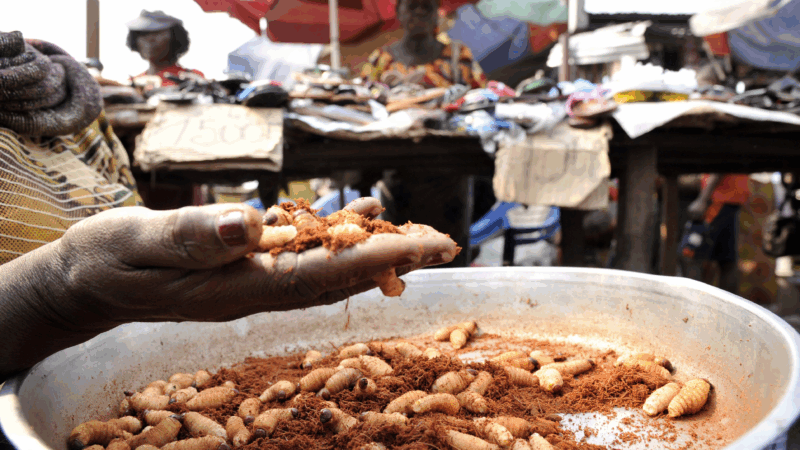‘You’ll have a long life’: In DR Congo, maggots and caterpillars are prized food
KINSHASA, Democratic Republic of Congo — They’re tastier than they look. Edible insects in the form of wriggling maggots or hairy caterpillars are both delicacy and staple in the Democratic Republic of Congo (DRC), a central African nation of nearly 120 million people.
In markets in the capital Kinshasa, tubs full of writhing white maggots line the alleyways, and women traders fry caterpillars, spiced with chili, over charcoal fires. “The more you eat caterpillars, the more you’ll have a long life,” says Trésor Kisanbu, clutching a small plastic bag of fried caterpillars, in Kinshasa’s largest market, Marché Liberté. “It strengthens your muscles and your eyes, it’s really organic,” he adds.
Villagers harvest fresh caterpillars and maggots from rotting tree trunks in forested areas in the Congolese interior. From there, they’re sent by the boatload down the Congo River — the second-largest in Africa — for sale in Kinshasa’s markets.
“People eat a lot of them,” says Mamman Coco, who runs a stall overflowing with piles of maize flour, dried beans and edible insects, in the center of Kinshasa’s sprawling central market.
She points to the caterpillars’ high protein and vitamin content as selling points, and the fact that they’re organic.

To taste, the caterpillars are earthy and bitter. Known as Mbinzo, in Kinshasa’s dominant language Lingala, the caterpillars are from a species of emperor moth.
They’re an expensive delicacy at about $200 a kilo, an enormous sum in a grindingly poor country where, according to the World Bank, two thirds of the population survive on under $2 a day.
Mpose is more popular fare. This is the Lingala term for the larvae of palm weevils, a type of beetle that lives in palm trees. They can be eaten with rice or fufu, a starchy staple, or as a crispy fried snack.
The larvae are mostly imported from rural areas too, but they can be raised commercially.
Congolese NGO Farms For Orphans raises Mpose maggots by the thousands to distribute to orphanages in Kinshasa, but it also sells its produce to market traders and Congolese émigrés nostalgic for a taste of home.
“In the DRC, meat products aren’t available to everyone,” explains Françoise Lukadi, the president of Farms for Orphans, because of their high cost. “If you buy very small quantities of insects, you gain more nutritional value than if you buy the same quantities of meat,” she says.
Eating insects is traditional in many parts of Congo. However, the practice isn’t common in all parts of the country. A huge state roughly the size of continental western Europe, Congo is extraordinarily diverse, with over 200 different ethnic groups and as many spoken languages.

Some research suggests that insect consumption has increased in recent decades. A 2023 study published in the journal Bois et Forêts des Tropiques found that in the Luki biosphere reserve about 250 miles southwest of Kinshasa, in western Congo, villagers only began to eat insects in the late 1970s.
According to the lead researcher Ernestine Lonpi Tipi, that period coincided with drought and the gradual degradation of forests, and subsequent scarcity of bushmeat. Then, back-to-back civil wars in the 1990s and 2000s cratered the economy.
Lonpi Tipi added that domesticating larvae production ultimately would lead to solving problems related to access to protein- and nutrition-rich food.
Françoise Lukadi of Farms for Orphans agrees. In a low rectangular building in Kinshasa’s main university, shelves are stacked with plastic tubs of palm weevils. Workers clean out the tubs and add in new food for the maggots: pieces of palm bark and organic waste from beer production.
Farms for Orphans produces about 300 kilos of maggots a month and it’s looking to expand production.
“They’re very good to eat,” Lukadi said, but she admitted that even in Congo, where people consume insects regularly, many are still squeamish.
U.K. leader’s chief of staff quits over hiring of Epstein friend as U.S. ambassador
British Prime Minister Keir Starmer's chief of staff resigned Sunday over the furor surrounding the appointment of Peter Mandelson as U.K. ambassador to the U.S. despite his ties to Jeffrey Epstein.
Trump administration lauds plastic surgeons’ statement on trans surgery for minors
A patient who came to regret the top surgery she got as a teen won a $2 million malpractice suit. Then, the American Society of Plastic Surgeons clarified its position that surgery is not recommended for transgender minors.
What you should know about Bad Bunny’s Super Bowl halftime show
Will the Puerto Rican superstar bring out any special guests? Will there be controversy? Here's what you should know about what could be the most significant concert of the year.
Sunday Puzzle: -IUM Pandemonium
NPR's Ayesha Rascoe plays the puzzle with KPBS listener Anthony Baio and Weekend Edition Puzzlemaster Will Shortz.
Thailand counts votes in early election with 3 main parties vying for power
Vote counting was underway in Thailand's early general election on Sunday, seen as a three-way race among competing visions of progressive, populist and old-fashioned patronage politics.
US ski star Lindsey Vonn crashes in Olympic downhill race
In an explosive crash near the top of the downhill course in Cortina, Vonn landed a jump perpendicular to the slope and tumbled to a stop shortly below.








